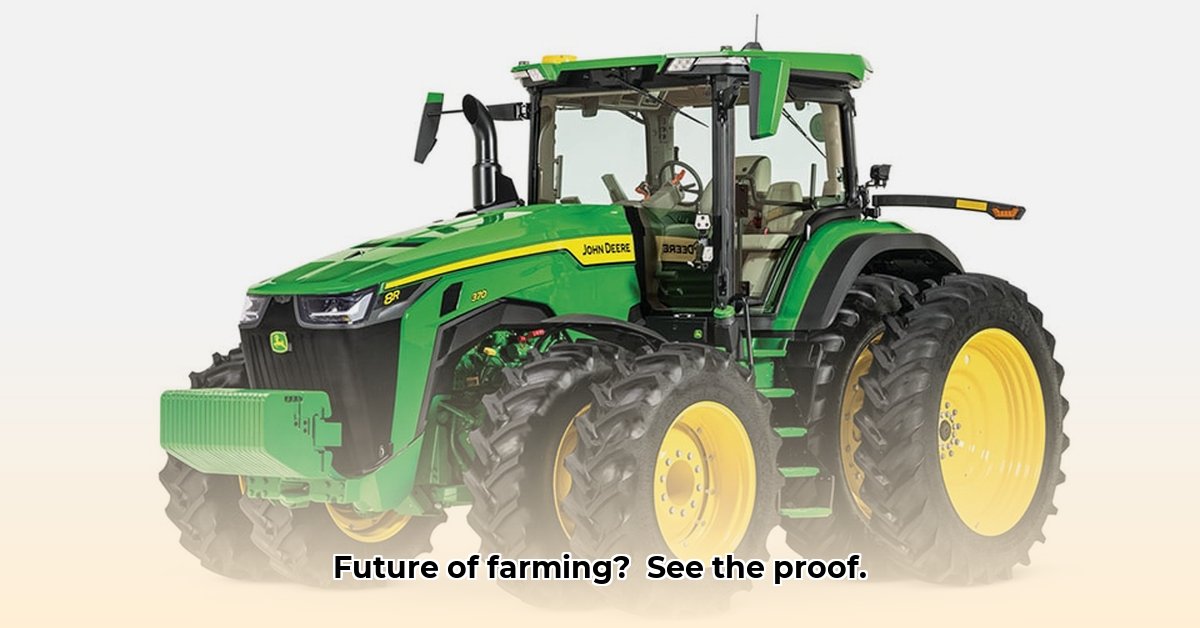
Pictures of John Deere Tractors: A Symbol of Agricultural Transformation
The iconic image of a John Deere tractor, gleaming green against a vast field, evokes a sense of American agriculture's enduring strength. But these machines represent more than just tradition; they are at the forefront of a critical transformation towards sustainable farming practices. This article explores John Deere's role in this evolution, examining its impact on key stakeholders and analyzing the temporal trends shaping the future of food production. For even more images, check out this awesome gallery.
John Deere: Market Leader and Sustainability Advocate
John Deere's dominance in the agricultural machinery market gives it significant influence on industry trends. Its extensive reach impacts the cost of equipment, the development of new technologies, and the overall direction of sustainable agriculture. This market leadership position demands a critical examination of environmental impact and a commitment to sustainable solutions—a challenge inherent to the company's scale and influence.
Sustainable Agriculture: Balancing Productivity and Environmental Stewardship
Traditional farming practices have contributed to significant environmental concerns, including greenhouse gas emissions and soil degradation. The demand for sustainable farming—producing food while minimizing environmental harm—is rapidly increasing. This necessitates a shift towards more efficient resource utilization and minimizing the ecological footprint of agricultural operations. This is not just an environmental imperative; it's a business imperative.
Precision Farming: Technology's Role in Resource Optimization
Modern John Deere tractors frequently incorporate advanced technologies such as GPS guidance systems, sensors, and automated controls. This precision agriculture approach allows farmers to optimize resource allocation, reducing waste and environmental impact. Tools like See & Spray™ and ExactShot™ enable targeted application of fertilizers and pesticides, maximizing efficiency and minimizing unnecessary chemical use. How impactful is this? Studies show significant reductions in chemical use and increased yield with precision farming, making it a key component of sustainable agriculture.
A John Deere tractor equipped with precision agriculture technology, demonstrating efficient resource use.
Stakeholder Impact: A Multifaceted Perspective
John Deere's actions affect a broad network of stakeholders. Farmers directly benefit from increased efficiency and productivity. Dealerships rely on John Deere for their economic viability. Competitors strive to innovate and capture market share. Investors assess the company's environmental and financial performance. Governments shape policies supporting sustainability and food security. Understanding the interconnectedness of these stakeholders is key to assessing John Deere's overall societal impact.
Temporal Trends: A Shifting Landscape
The evolution of John Deere tractors reflects broader industry trends. Early models lacked the sophistication of modern machines, highlighting the significant technological advancements in efficiency and precision. This evolution is readily visible when comparing images of older and newer John Deere tractors; the changes demonstrate a clear commitment to improving sustainability and reducing the environmental impact of farming. What will the next generation of tractors look like? Current trends suggest a focus on electrification and further integration of artificial intelligence.
John Deere's Contribution to Sustainable Agricultural Practices
John Deere's commitment to sustainability isn't merely a marketing ploy; it's a strategic imperative. This commitment manifests in several key areas:
Precision Agriculture: Optimizing Resource Use
By enabling targeted application of inputs, precision agriculture reduces waste and minimizes environmental impact. This approach ensures that resources are used only where and when needed, enhancing both efficiency and environmental responsibility.
Electrification: Reducing Carbon Footprint
The transition towards electric and hybrid tractors marks a crucial step in decreasing greenhouse gas emissions from agricultural operations. This commitment directly addresses climate concerns and reduces reliance on fossil fuels. How quickly this transition will occur depends on various factors, including the development of an adequate charging infrastructure in rural areas.
Sustainable Supply Chains: A Holistic Approach
John Deere is actively working to improve its supply chains through responsible sourcing of materials and minimizing the environmental impact throughout the manufacturing process. This demonstrates a holistic approach to sustainability, acknowledging that responsibility extends beyond the final product to the entire lifecycle of its creation.
Challenges and Opportunities: Navigating the Path Forward
While John Deere's efforts are noteworthy, challenges remain. Widespread adoption of new technologies requires significant investment from farmers, and a learning curve is inherent in the adoption of new equipment and practices. Further development of infrastructure, particularly rural electricity grids to support electric tractors, is also necessary. Nonetheless, the long-term benefits—enhanced productivity and reduced environmental impact—are compelling arguments for continued innovation and adoption.
Key Takeaways: A Sustainable Future for Farming
- Precision agriculture optimizes resource use, reducing environmental impact.
- Electrification lowers greenhouse gas emissions from farming operations.
- Sustainable supply chains emphasize responsible manufacturing practices.
- Challenges remain, but the long-term benefits are significant.
John Deere's role in sustainable agriculture is multifaceted and continues to evolve. Through targeted innovation and collaboration with stakeholders across the agricultural sector, John Deere is significantly contributing to a more sustainable and efficient future for food production. The future of farming hinges on continuous innovation and a shared commitment to environmental stewardship – a challenge that John Deere is actively addressing.